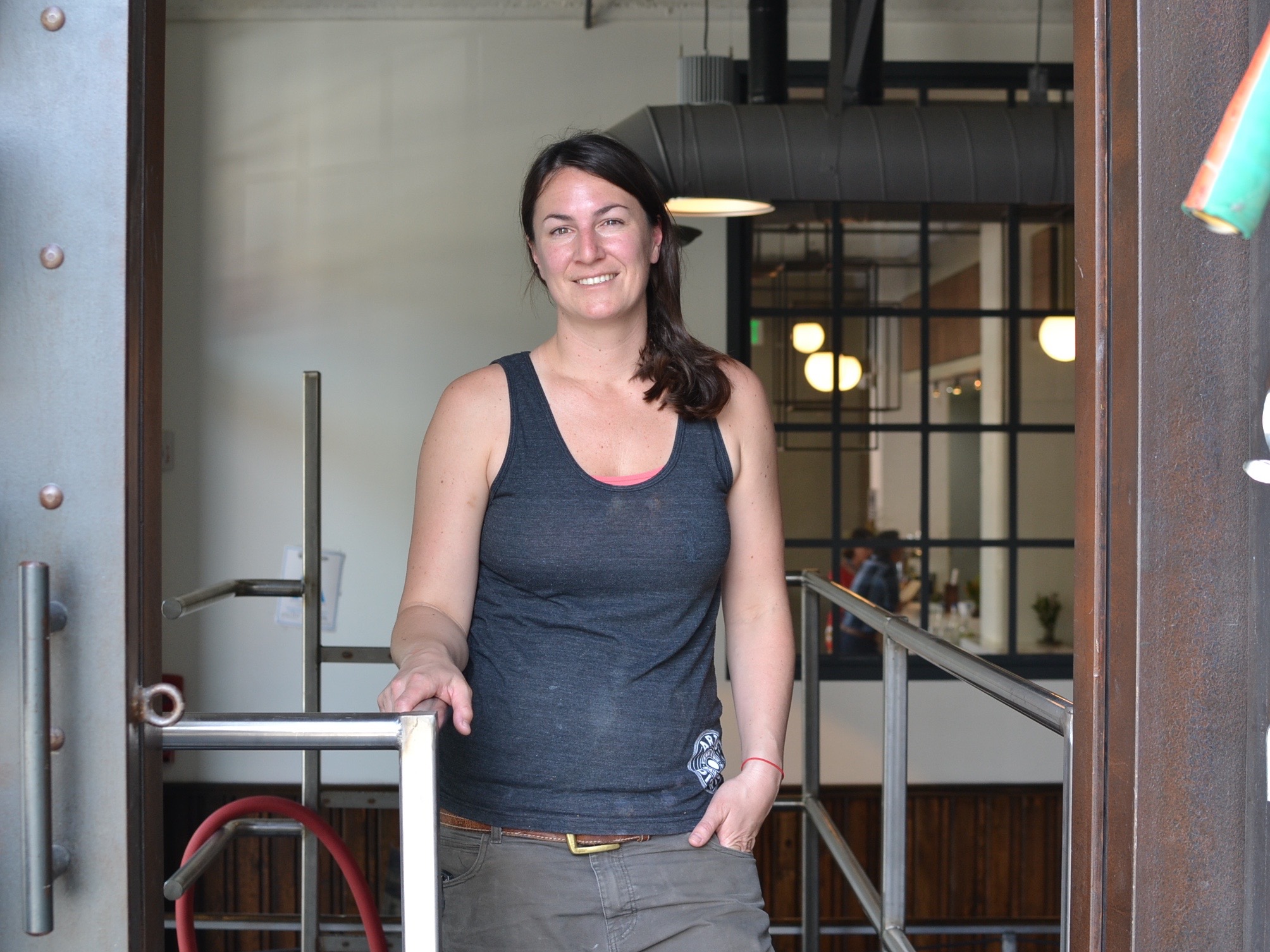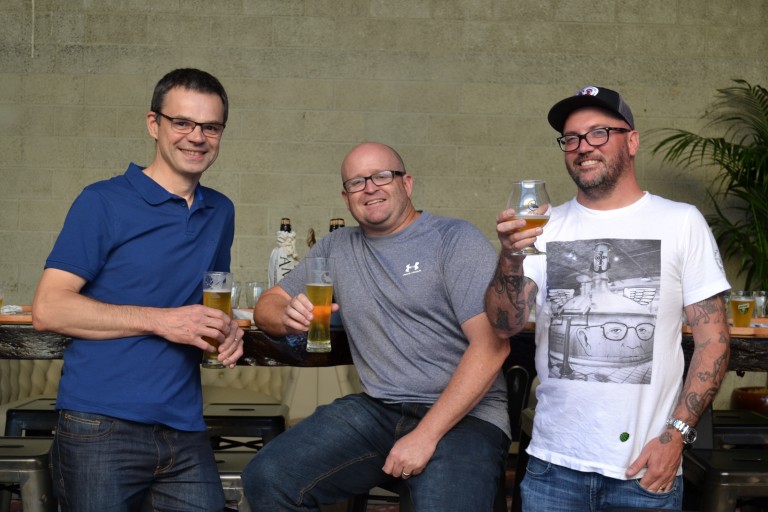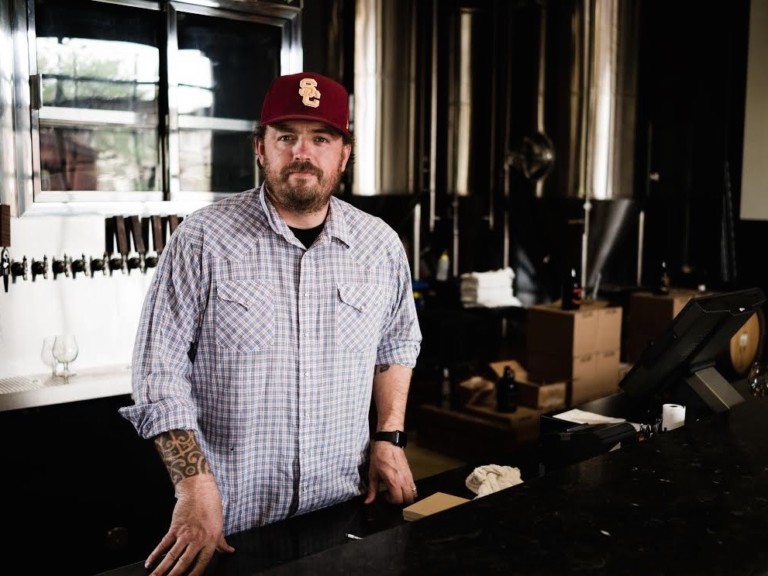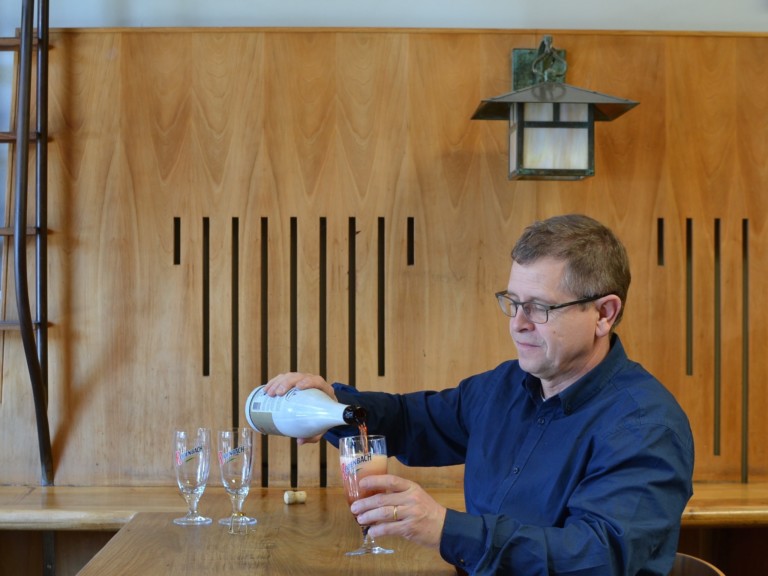INTERVIEW CONTINUED FROM PREVIOUS PAGE
JL: How did the opportunity with Arts District Brewing come about for you?
DR: I knew Brian Lenzo from Blue Palms when I was homebrewing in L.A. They just had their seventh anniversary. I went to the soft opening and met him there with a friend who was a beer blogger. I got a media pass and went. I was introduced to him early on, and there weren’t a lot of beer places, so it was exciting then. I’ve known Brian since then from various events. He approached me a year before we started talking seriously. I didn’t think he was serious and I had only been at Solana Beach for a year and a half and hadn’t accomplished everything I wanted to do there. He said, “We’re starting a brewery up in L.A. and need a good brewer.” I was really happy in Solana Beach. A year later, he sent me a text and was like, “We’re getting close to opening the brewery. Here are a few figures about what we want to do. Are you interested?” “Actually, that does sound kind of cool.” Brian is the beer link between 213 Group, who owns Cole’s and Seven Grand and Golden Gopher and Tony’s, a lot of bars. Brian was in charge of figuring out who the head brewer was going to be. It was a really good fit.
I was ready to do something a little harder than what I was doing in Solana. Solana was great, but there wasn’t any potential for doing anything more. I was limited by the space and the area. You’re dependent at Solana Beach for Bressi Ranch or somebody else to order your grain or take your grain away. It was a nice, cushy brewing job, but after a couple years, I was like, “I really want to know how to do this stuff and to fix things and install things. The only way to learn is to do it.” This had all of those aspects, to be able to design the beer program and develop the staff from the ground up, and deciding where the equipment is going and how it’s getting hooked up, and which material we’re using, was a great opportunity for both of us.
JL: So you work closely with Brian on anything beer related for Arts District Brewing?
DR: Yeah, he’s still really involved on the beer side and beer program. He’s been organizing tap takeovers through connections. Stone founder Greg Koch showed up, and we’re having The Bruery come do 12 different beers. He’s able to negotiate some pretty cool things.
JL: What’s distinctive about the L.A. beer scene and this point, and how do you feel Arts District Brewing fits in?
DR: Arts District Brewing totally fits into the L.A. beer scene because everything’s just really developing right now. It’s developing differently than the beer scene I saw develop in San Diego. There’s no guideline for it anyways, but it’s interesting to see things happen differently. People at non-beer bars are starting to get it.
There’s this liquor store, and not going to say which one, but the guy’s just so excited about his beer. “Oh, I got this great beer from Kern River, Citra, have you heard of it? I’m so excited.” Yeah, but I know he doesn’t store his beer cold all the time. Just slowly educating people. I don’t want to break his heart right away, but I’ve got to tell him, “You can’t store this beer warm, especially the hoppy ones. You’re just killing the thing that you love.” Like a really nice steak, dropping it on the ground, now how do you feel about it? Watching people develop the education about how to treat beer, and learning how to really taste for yourself what good beer is, and not just taking someone’s word for it. Hearing that Citra is a good beer and then going to the store and it’s been sitting warm for two weeks, chilling before you buy it, and then drinking it. “Yeah, that’ a good beer.” Well, it was a really good beer that’s been treated improperly. It doesn’t taste good anymore.
Seeing people develop their palates and develop programs to deal with this, everyone’s been excited about it. Within 213, sending out my beer within the network is always something they wanted to do. They’re on board with it. Awesome. We always have a place for overflow. If for some reason I have an IPA that’s going on two weeks, I can shove it out the door and it will be gone in two days. Super. I never have to deal with having too much. Then came up the issue, “Who cleans your draft lines guys? Do you do it yourself? Because we certainly don’t have salespeople to go do it. It’s just me and the assistant.” They were like, “Budweiser does it.” Oh really? Let’s learn to clean draft lines. Go ask your rep if they’re pulling all the draft lines and checking all the gaskets. Probably not. We started sending out our bar managers who knew how to properly clean the lines and having them ask questions. Are they circulating Glycol or just running it through? When was the last time they checked the gaskets? Do they have spare ones? We started asking them all those questions because everyone’s still in that stage where they don’t totally understand. People taking care of the draft system are just like, “Who gives a fuck. These people don’t know.” Now these people are getting educated so they can’t be taken advantage of by big companies who are like, “You have to keep a handle on for us because we’re cleaning your draft system.” That shit totally happens.
Or somebody who bought a draft system for a bar, something that is totally illegal, and they feel that they owe them something. Your draft system’s 12 years old, guys. You’ve got to get a new one. Don’t let Peroni buy it for you, so you don’t have to be tied to Peroni. Buy it yourself. It’s not that big a deal. Once you understand what’s going on, you can accurately gauge how much that’s going to cost. Well that’s just going to be a couple thousand dollars. We only need to replace the lines. Or you can be like, “That tower is fully rotten, and this is going to be a major investment.” It’s just getting people educated and seeing everyone’s mind changed about things. L.A. is really interesting and really cool, and it’s happening, but it’s a lot of groundwork and there’s a lot to do still, but it’s happening differently than it did in San Diego and it’s kind of neat to see it.
JL: The potential for the number of places to pour craft beer is much higher in L.A. than in San Diego.
DR: Yeah, but there’s a lot more work to be done, too, like aging draft systems and the level of education people are starting at, and where they need to be.









Blog Comments
ferm
February 28, 2018 at 12:33 PM
So many times I’ve heard “I wonder if I can do this and make a living.” and me myself answered “no”, instead I started selling accessories. It’s cool, but still I do wonder sometimes “what if”